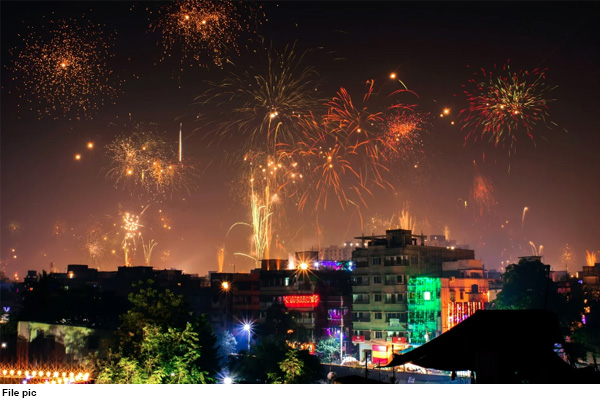Diwali, also known as the Festival of Lights, is one of the most important festivals celebrated in India and by Indian communities worldwide. It symbolizes the victory of light over darkness and good over evil. The festival typically spans five days, with the main celebrations occurring on the third day.
Diwali 2024 Laxmi Puja Muhurat
Nishita Muhurat of Laxmi Puja – October 31 is from 11:39 pm to 12:31 am. Pradosh Kaal – Pradosh Kaal on October 31 will be from 05:36 pm to 08:11 pm. Taurus Ascendant – It will be from 06:25 pm to 08:20 pm.
Here are some key elements of Diwali:
Rituals and Prayers: People worship Lakshmi, the goddess of wealth and prosperity, and Ganesha, the remover of obstacles. Homes are often cleaned and decorated to welcome them.
Lighting and Decorations: Homes are adorned with diyas (oil lamps), candles, and colorful rangoli designs made from colored powders, rice, or flower petals.
Fireworks: Diwali is famous for its fireworks, symbolizing the joy of the festival and the victory of light.
Sweets and Feasting: Families prepare and share a variety of sweets and snacks, often exchanging gifts with friends and relatives.
Cultural Significance: The festival has various legends associated with it, including the return of Lord Rama to Ayodhya after defeating the demon king Ravana and the celebration of Lord Krishna’s victory over Narakasura.
Significance of diwali
Diwali holds deep significance in various cultural and religious contexts, primarily in Hinduism, but also in Sikhism, Jainism, and Buddhism. Here are some key aspects of its significance:
Victory of Light Over Darkness: Diwali symbolizes the triumph of good over evil and light over darkness. This theme is reflected in the lighting of lamps and fireworks, representing the hope and joy that light brings.
Hindu Mythology: In Hindu tradition, Diwali commemorates several significant events:
Return of Lord Rama: It marks the return of Lord Rama to Ayodhya after defeating the demon king Ravana, signifying the victory of righteousness.
Goddess Lakshmi: The festival is dedicated to Lakshmi, the goddess of wealth and prosperity, encouraging prayers for financial well-being and success.
New Beginnings: Diwali is often seen as a time for new beginnings. Many people start new ventures, clean their homes, and purchase new items, symbolizing renewal and fresh starts.
Unity and Community: The festival fosters a sense of community and togetherness. Families and friends come together to celebrate, share meals, and exchange gifts, reinforcing social bonds.
Spiritual Reflection: Beyond the festivities, Diwali encourages introspection and spiritual growth. It’s a time to reflect on one’s actions, seek forgiveness, and commit to positive changes.
Cultural Diversity: In Sikhism, it commemorates the release of Guru Hargobind Ji from imprisonment, while Jains celebrate the nirvana (liberation) of Lord Mahavira. Buddhists in some regions also observe it, celebrating the victory of Emperor Ashoka’s conversion to Buddhism.
These themes make Diwali not just a festival of lights but a rich tapestry of cultural and spiritual significance.

